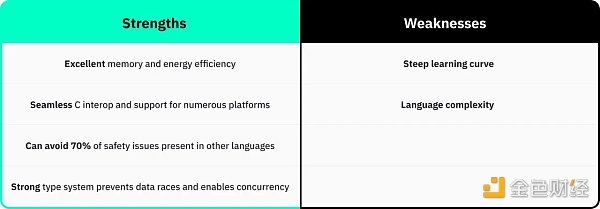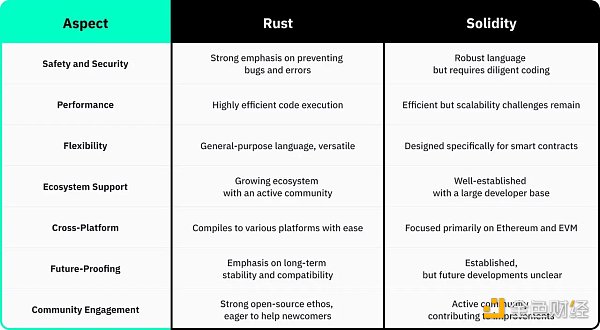Solidity VS Rust Should smart contract developers choose classics or innovation?
Solidity vs Rust Classic or Innovative Choice for Smart Contract Developers?Author: Vara Network Translation: Odaily Planet Daily Jessica
Editor’s Note: Before choosing a specific smart contract language, it is wise to study in depth and find out which language is suitable for your project. To write smart contracts, two popular choices stand out: Solidity and Rust, each with its own characteristics. Vara Network discusses the differences between Solidity and Rust in this article (note that Vara has chosen Rust).
Solidity: The Most Popular Blockchain Development Programming Language
Solidity, as a high-level language, focuses on data and objects rather than complex functions. Being statically-typed, it can detect errors during compilation, making it more reliable. It was created as the programming language for smart contracts on the Ethereum blockchain.
Solidity is not limited to Ethereum, its functionality is also supported by networks such as Polygon, Avalanche, Polkadot, Optimism, and Arbitrum. Although various Polkadot parachains have integrated the EVM, not all of them have adopted this functionality. Solidity is designed to be portable across devices with EVM executors, enabling smooth execution.
- Can re-collateralization prevent MEV theft? Exploring the new use case of MEV-Boost+ for EigenLayer re-collateralization.
- Solana’s Past, Present, and Future.
- Multicoin Capital DePIN Network Design Space Exploration
Solidity has become a popular choice for smart contract development, taking into account Ethereum compatibility factors:
1. Built-in conditions
Solidity allows operations to be easily executed based on specific conditions. Developers do not need to write complex conditional statements separately. Instead, they can specify these conditions in the source code. Once all requirements are met, the code will automatically execute the operation.
2. Simplified data types
Solidity has built-in support for common data types such as integers, strings, floating-point numbers, and arrays. Additionally, developers can even create custom data types for their smart contracts.
3. Safety during development
The compiler checks for errors in the code as developers write it, alerting them to potential issues. This feature is particularly useful when dealing with large and complex DApps.
However, Solidity also has its drawbacks.
Being a high-level language, it is not as fast as other languages. Its limited speed can be troublesome when handling complex smart contracts or a large number of transactions. The design flaws of Solidity have led to funds being lost due to hacker attacks. For example, in the 2016 DAO hack, hackers exploited a recursive Ethereum sending vulnerability to steal $150 million.
Odaily Planet Daily Note: Solidity was first used by Gavin
Since its release in 2015, Rust has gained significant attention among developers. It has consistently been the most loved or most appreciated language on Stack Overflow (for the past 8 years).
So why do developers (in general) like this programming language? Rust successfully addresses the challenge of providing high-performance tools for designing applications without compromising security, effectively preventing potential vulnerabilities. Rust has a powerful type system and strict memory safety. The language ensures:
-
Performance – Rust is known for its speed and memory efficiency. Without a garbage collector, Rust is suitable for supporting performance-critical services, running on embedded devices, and seamlessly integrating with other languages.
-
Reliability – Rust’s rich type system and ownership model ensure memory safety and thread safety, allowing developers to eliminate many errors at compile time, enhancing the overall reliability of the code.
-
Productivity – Rust provides excellent documentation, friendly compiler with useful error messages, and first-class tools. Its integrated package manager and build tools, intelligent multi-editor support with autocomplete and type checking, and automatic formatter contribute to a smooth and efficient development experience.

Advantages and Disadvantages of the Rust Programming Language
Like all languages, Rust also has some disadvantages, but its advantages far outweigh the disadvantages for blockchain development. Additionally, the community support and how Rust handles its flaws and challenges make the programming language attractive due to active participation. Asynchronous programming requests and implementations highlight Rust’s participatory community.
Therefore, Rust is an excellent choice for building secure and robust blockchain applications. Its high performance and low-level control allow developers to optimize their code.
Odaily Star Daily Note: Rust was designed and released by Mozilla employee Graydon Hoare in 2006. It is a low-level language similar to C++. Most blockchain systems typically choose to be compatible with EVM in the initial stage because it facilitates developers to quickly get involved based on experience. However, Solana chose Rust. Unlike Solidity, its design intention is a general-purpose programming language, not limited to smart contracts.
Common Advantages and Differences between Solidity and Rust
Both of these languages are Turing complete, allowing them to effectively handle complex computational problems.
Their multi-chain compatibility enables these languages to promote interoperability across various blockchain networks. Solidity has expanded its support to include Layer 2 and modular blockchains, sidechains, and EVM-compatible Layer 1 blockchains. Similarly, Rust has extended its support to different blockchain networks such as Solana and Near, and provides implementations based on the Substrate framework.
Although Rust and Solidity have similarities, they are different in various applications, as shown in the table below:

Differences between Solidity and Rust
Conclusion
Understanding the advantages of Solidity and Rust can help determine which programming language to choose for DApp development. However, the differences between Solidity and Rust should also be compared with the trade-offs of each language against the other.
The most obvious trade-offs of using Rust instead of Solidity for DApp development include slower compilation speed and learning difficulties. Rust relies on low-level virtual machines or LLVM architecture to generate code. For large projects, program compilation may take more than 10 minutes.
On the other hand, the debate between Solidity and Rust also outlines the challenges of learning Rust programming. For example, developers must make an effort to understand the concepts of ownership and borrowing systems. In addition, Rust programs require creating a complete codebase from scratch.
On the other hand, compared to Rust, Solidity also brings quite a few frustrations. A prominent issue is the common problems in earlier versions of Solidity before version 0.8. Another problem with Solidity is the difficulty of static analysis due to its Turing completeness.
Solidity and Rust both have unique features and challenges. Solidity is a popular choice for smart contract development as it is the core language of Ethereum. On the other hand, Rust is the core language of Solana, a rising competitor to Ethereum.
The comparison between Solidity and Rust also outlines how to obtain specific advantages and disadvantages by choosing one of them. Ultimately, the choice of programming language depends on the use case and specific features required by the developer.
We will continue to update Blocking; if you have any questions or suggestions, please contact us!
Was this article helpful?
93 out of 132 found this helpful
Related articles
- ArkStream Capital Overview of Lens Protocol’s Trends, How to Break Through and Compete with FT and Telegram Ecosystem?
- Arca Chief Investment Officer summarizes nine important gains from managing cryptocurrency funds over the past five years.
- Exploring the Next Consensus Layer Revolution of Ethereum How Should the Post-Deneb Era Develop?
- Multicoin Three Necessary Considerations for Building the DePIN Network – Hardware, Supply Thresholds, and Demand
- Delphi Digital Co-founder ZK May Be the Endgame, Pondering My Unsolved Mystery
- Microsoft launches AI Copilot for Windows 11
- Based on the understanding of the exchange business logic, why does Binance’s aggregated wallet need to consume hundreds of ETH?






